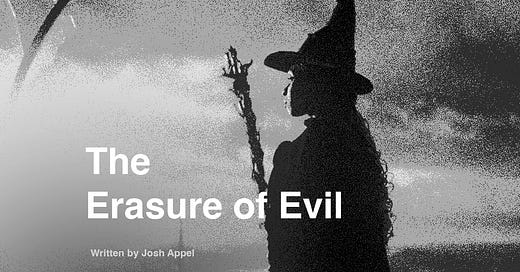The Erasure of Evil: Wicked, Luigi Mangione and Daniel Penny
Why ignoring evil is destroying our society
In one of the opening lines of the hit Broadway musical Wicked, the narrator poses the following question:
Are people born wicked? Or do they have wickedness thrust upon them?
Last month, Wicked was released in theaters and has thus far been met with praise. The central plot of Wickedfollows the backstory of the supposedly “Wicked Witch” of the West from the classic Wizard of Oz tale. Turning the story on its head, the musical tells the story of Elphaba the witch, a beaten down outcast who is actually a beacon of morality in a world of corruption. The plot leads us to conclude that although appearing as evil in the original production, Elphaba is not inherently wicked at all but instead a byproduct of a world that causes her to be so.
Is it any surprise then in this context society is simultaneously celebrating a murderer and tarnishing a hero?
A few weeks ago, the CEO of United Healthcare, Brian Thompson, was murdered in Times Square in broad daylight. While many condemned the alleged and probable murderer – Luigi Mangione – there are others who have championed his “courage” and action. Mangione was identified by a McDonalds worker who alerted 911 to his suspicious presence. Since then, the very same McDonalds has been flooded with negative and hateful reviews for turning in who they see as a hero. Merchandise and apparel with the call “Free Luigi” have sprung up in droves. Despite killing an innocent father of two children, Mangione is being hailed as a beacon of morality in a world of corruption. Those who argue on behalf of Mangione’s heroism say that the killing of Thompson was justified on account of the fact that he works for a healthcare company – part of a system of American healthcare which has caused the death of millions who are uninsured. Ex-Washington Post Reporter Taylor Lorenz remarked on Piers Morgan’s show that she felt a sense of joy and justice when hearing of the death of Thompson. When Morgan retorts and asks, “how can this make you joyful?” This guy is a husband, he’s a father, and he’s been gunned down in the middle of Manhattan!” Lorenz replies, “so are the tens of thousands of Americans that he murdered!”
This is a gross mischaracterization. There is no justification for murder in broad daylight of an innocent man – ever. Period. Political quibbles and policy differences – even if resulting in strife for many – is not an excuse to gun down another soul. Our moral degeneration has led us to a place where instead of decrying villains we justify them and turn them into cultural icons.
At the same time, it is no coincidence then that where we find actual heroism, we too cannot seem to find moral clarity on the matter. A few months ago, Jordan Neely – a clearly drug addled man – threatened to kill New Yorkers on the subway. These were innocent people just trying to get to work. Luckily, on that subway was the chivalrous Daniel Penny, a former marine, who protected the lives of those around him by subduing Neely with a chokehold. Unfortunately, from the combination of drugs and poor respiratory, Neely died following the incident. Penny was tried for murder and negligence. This week Penny was acquitted. And yet, there are those who don’t look at Penny as a good Samaritan who saved lives but instead as a dangerous vigilante! New York representative Alexandria Ocasio-Cortez said that “the subway will be safer if we lock up people like Daniel Penny.” Jamal Bowman penned a response which he entitled “Dear White People” in which he rages against the pervasion of white supremacy in society.
This complete and total ethical inversion should frighten anyone who stands for the values of truth, justice and courage. If, as a society, we cannot denounce evil in our midst, then we have already lost. In his Psalms (97:10), King David so eloquently put it: “those who love God, despise evil.”
We cannot and should not tolerate evil behavior or we risk forfeiting our humanity and divine image for a callous shell of a former glory.




